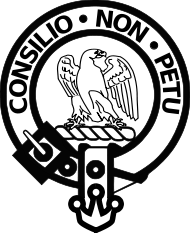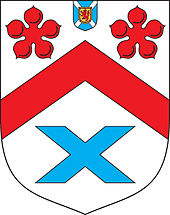- Clan Agnew
-
Clan Agnew Crest badge 
Crest: An eagle issuant and reguardant Proper. Motto: CONSILIO NON IMPETU ("By Council, not by Force") Profile Region Lowlands District Dumfries and Galloway Chief

Sir Crispin Agnew 11th Baronet of Lochnaw Historic seat Lochnaw Castle Clan Agnew is a Lowland Scottish clan from Wigtownshire and Galloway in the southwest of Scotland.
Contents
History
Origins
There are two theories as to the origins of the name Agnew. The most widely accepted is that the name is French and derives from the Barony d'Agneaux in Normandy. Emigrants from the region first settled in England before moving north in the 12th century to Liddlesdale, Scotland. The other theory is that the Clan Agnew was connected to one of the tribes in Ulster, Ireland, perhaps a sept of O'Gnive — pronounced O'New. Other versions of the name include Egnew, Aganew, Vans Agnew, O'Gnive, O'Gnyw, O Gniomha, and MacGnive. The Agnews may be related to King Somerled from whom the Clan MacDonald descends. The Italian family AGNELLI (of FIAT fame) may be related.
14th century
In 1318 the Agnew Lord of Larne accompanied Edward Bruce, younger brother of King Robert I of Scotland, to Ireland. Edward had been invited by the Irish Lords to expel the English and to rule as High King of Ireland. Agnew stayed in Ireland for three years while Edward attempted to establish himself.
15th century
Andrew Agnew of Lochnaw was granted the lands and constableship of Lochnaw Castle in 1426. In 1451 he was appointed Sheriff of Wigtown, an honour still held by his direct descendants.
During the 15th century, the Clan Agnew rose to power under the influential Clan Douglas. The Agnews of Galloway initially benefited when the Clan Douglas fell out of favour with the monarch. However this brought them into conflict with the Clan MacKie and the Clan MacLellan.
16th century
Andrew Agnew of Lochnaw was killed at the Battle of Pinkie in 1547, fighting against the English.
17th century
Sir Patrick Agnew was MP for Wigtownshire from 1628 to 1633, and again from 1643 to 1647. He was made a Baronet of Nova Scotia on 28 July 1629. He married Anne Stewart, daughter of the first Earl of Galloway. When he died in 1661, he was succeeded by his eldest son, Andrew, who would also be returned as MP for Wigtownshire. Sir Patrick was created Sheriff of both Kirkcudbright and Wigtown in the 1650s, while Scotland was part of the Protectorate with England.
18th century
Andrew Agnew, the fifth Baronet, married a kinswoman, Eleanor Agnew of Lochryan, with whom he had twenty one children. He was a decorated soldier commanding the 21st Foot (which later became the Royal Scots Fusiliers) against the French at the Battle of Dettingen the French in 1743. King George II of Great Britain, the last British monarch to led troops in battle, remarked to Agnew that French cavalry had been let among his regiment. Sir Andrew replied, "Yes, please your Majesty, but they didna win back again".
During the 1745 Jacobite Rising the Clan Agnew continued their support of the British Government. Sir Andrew held Blair Castle, seat of the Duke of Atholl who was chief of the Clan Murray, against the Jacobite forces. The Clan Murray were divided, their chief supporting the British Government while his son supported the Jacobites. Agnew's forces were near starvation when Charles Edward Stuart called the forces to retreat to Inverness to meet the advance of Prince William Augustus, Duke of Cumberland. See main article: Siege of Blair Castle.[1]
Clan Chief
Castles
- Lochnaw Castle was the seat of the chief of Clan Agnew. [1]
References
- ^ The Scots magazine and Edinburgh literary miscellany, Volume 70, Part 1 (1808).
External links
- http://www.electricscotland.com/webclans/atoc/agnew2.html
- http://www.scotclans.com/clans/Agnew/history.html
Scottish clans Clans with chiefs Agnew · Anstruther · Arbuthnott · Arthur · Bannerman · Barclay · Borthwick · Boyd · Boyle · Brodie · Broun · Bruce · Buchan · Burnett · Cameron · Campbell · Carmichael · Carnegie · Cathcart · Charteris · Chattan · Chisholm · Cochrane · Colquhoun · Colville · Cranstoun · Crichton · Cumming · Darroch · Davidson · Dewar · Drummond · Dunbar · Dundas · Durie · Elliot · Elphinstone · Erskine · Farquharson · Fergusson · Forbes · Forsyth · Fraser · Fraser of Lovat · Gayre · Gordon · Graham · Grant · Gregor · Grierson · Guthrie · Haig · Haldane · Hamilton · Hannay · Hay · Henderson · Home · Hope · Hunter · Irvine · Jardine · Johnstone · Keith · Kennedy · Kerr · Kincaid · Lamont · Leask · Lennox · Leslie · Lindsay · Lockhart · Lumsden · Lyon · MacAlister · MacBain · MacDonald · Macdonald of Clanranald · MacDonald of Keppoch · Macdonald of Sleat · MacDonell of Glengarry · MacDougall · Macdowall · MacIntyre · Mackay · Mackenzie · Mackinnon · Mackintosh · Maclachlan · Maclaine of Lochbuie · MacLaren · MacLea (Livingstone) · Maclean · MacLennan · MacLeod · MacLeod of Lewis · MacMillan · Macnab · Macnaghten · MacNeacail · MacNeil · Macpherson · MacTavish · MacThomas · Maitland · Makgill · Malcolm (MacCallum) · Mar · Marjoribanks · Matheson · Menzies · Moffat · Moncreiffe · Montgomery · Morrison · Munro · Murray · Napier · Nesbitt · Nicolson · Ogilvy · Oliphant · Primrose · Ramsay · Rattray · Riddell · Robertson · Rollo · Rose · Ross · Ruthven · Sandilands · Scott · Scrymgeour · Sempill · Shaw · Sinclair · Skene · Spens · Stirling · Strange · Stuart of Bute · Sutherland · Swinton · Trotter · Urquhart · Wallace · Wedderburn · Wemyss · Wood ·
Armigerous clans Abercromby · Abernethy · Adair · Adam · Aikenhead · Ainslie · Aiton · Allardice · Anderson · Armstrong · Arnott · Auchinleck · Baillie · Baird · Balfour · Bannatyne · Baxter · Bell · Belshes · Bethune · Beveridge · Binning · Bissett · Blackadder · Blackstock · Blair · Blane · Blyth · Boswell · Brisbane · Buchanan · Butter · Byres · Cairns · Calder · Caldwell · Callender · Campbell of Breadalbane · Campbell of Cawdor · Carruthers · Cheyne · Chalmers · Clelland · Clephane · Cockburn · Congilton · Craig · Crawford · Crosbie · Cunningham · Dalmahoy · Dalrymple · Dalzell · Dennistoun · Don · Douglas · Duncan · Dunlop · Edmonstone · Fairlie · Falconer · Fenton · Fleming · Fletcher · Forrester · Fotheringham · Fullarton · Galbraith · Galloway · Gardyne · Gartshore · Ged · Gibsone · Gladstains · Glas · Glen · Glendinning · Gray · Gunn · Haliburton · Halkerston · Halket · Hepburn · Heron · Herries · Hogg · Hopkirk · Horsburgh · Houston · Hutton · Inglis · Innes · Kelly · Kinloch · Kinnaird · Kinnear · Kinninmont · Kirkcaldy · Kirkpatrick · Laing · Lammie · Langlands · Learmonth · Little · Logan · Logie · Lundin · Lyle · MacAulay · Macbrayne · MacDuff · MacEwen · MacFarlane · Macfie · Macgillivray · MacInnes · MacIver · Mackie · MacLellan · Macquarrie · Macqueen · Macrae · Masterton · Maule · Maxton · Maxwell · McCorquodale · McCulloch · McKerrell · Meldrum · Melville · Mercer · Middleton · Moncur · Monteith · Monypenny · Mouat · Moubray · Mow · Muir · Murray of Atholl · Nairn · Nevoy · Newlands · Newton · Norvel · Ochterlony · Orrock · Paisley · Paterson · Pennycook · Pentland · Peter · Pitblado · Pitcairn · Pollock · Polwarth · Porterfield · Preston · Pringle · Purves · Rait · Ralston · Renton · Roberton · Rossie · Russell · Rutherford · Schaw · Seton · Skirving · Somerville · Spalding · Spottiswood · Stewart · Stewart of Appin · Strachan · Straiton · Strange · Sydserf · Symmers · Tailyour · Tait · Tennant · Troup · Turnbull · Tweedie · Udny · Vans · Walkinshaw · Wardlaw · Watson · Wauchope · Weir · Whitefoord · Whitelaw · Wishart · Young
Culture and society Scotland · Clan chief · Septs · Clan badge · Clan crest · Clan battles · Tartan · Bagpipes · Clearances · Kilt · Manrent · The Highlands · Battle of Culloden · Highland games · Border Reivers · Scottish heraldry · Scottish surnames
Categories:- Scottish clans
Wikimedia Foundation. 2010.

